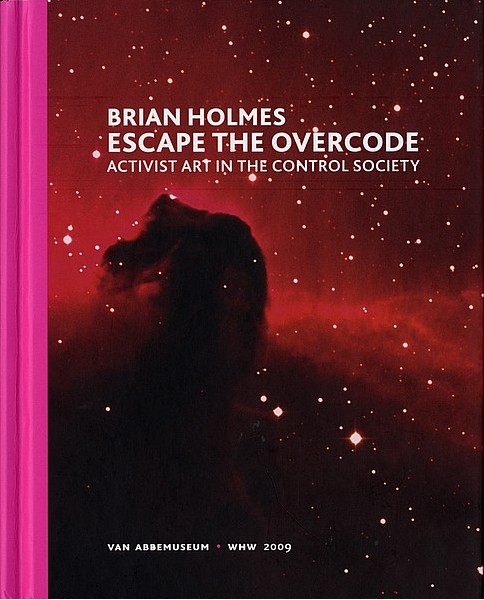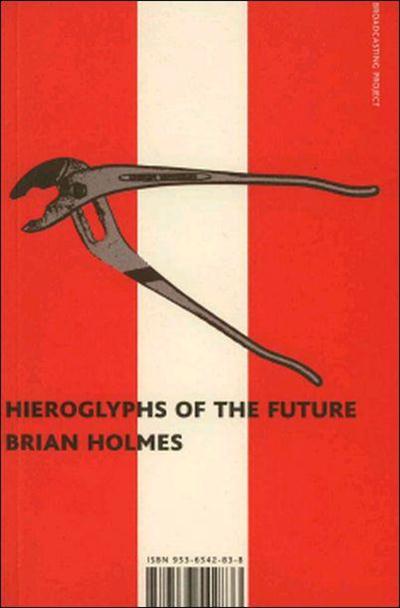Brian Holmes: Escape the Overcode: Activist Art in the Control Society (2009)
Filed under book | Tags: · activism, art, capitalism, critique, cybernetics, geopoetics, geopolitics, mapping, media activism, network culture, politics, social movements, theory

“This publication contains a selection of texts and essays by the writer Brian Holmes that engage with the possibilities and problematics of geopolitics and geopoetics. Holmes is a crucial contemporary writer and thinker whose insight into current social and political developments and how they relate to artistic processes opens up a new field of “geocritique”.
The examples he cites extend across Latin America, Europe and Asia, where he looks at networks, artworks, films, institutions and protest movements for signs of how future progressive strategies might be shaped. The texts here are connected in part with the long-term collaborative research project Continental Drift.”
Publisher Van Abbemuseum, Eindhoven, and Zagreb: WHW, 2009
Research Series, 2
ISBN: 9789070149987
414 pages
HTML
PDF’d HTML (updated on 2015-4-28)
Brian Holmes: Hieroglyphs of the Future: Art & Politics in a Networked Era (2003)
Filed under book | Tags: · activism, art, capitalism, critique, cybernetics, mapping, media activism, network culture, politics, social movements

“Networks redefine urban and social borders and can be interpreted in many ways according to the chosen perspective, a limited territory or the entire globe, revealing at the same time the potential and the limits of their actions. This collection of essays, which features a solid political approach intertwined with art, pushes the limits of the critique of the mobility as defined by human beings and the reconfiguration of urban space, analyzing the powers and desired contained in it. A hyperlinking of transnational forces of opposition are invited to play a strategic game coordinating their efforts for imagining future alternative and sustainable realities, through a media struggle which uses the same propaganda tools of capitalism. The collaboration with the art collective Bureau D’Etudes and the resulting maps of power produced by them are nodal, but the core of these essays are the instruments of analysis offered, which elaborate new expressions to effectively decode our contemporary world.”
Publisher Arkzin Communications / What, How and for Whom, Paris/Zagreb, 2003
Broadcasting series, 3
ISBN 9536542838, 9789536542833
294 pages
PDF (updated on 2015-4-28)
Comment (0)Stephen C. Foster (ed.): Hans Richter. Activism, Modernism, and the Avant-Garde (1998)
Filed under book | Tags: · abstract cinema, activism, art, art history, avant-garde, cinema

Few artists spanned the movements of early twentieth-century art as completely as did Hans Richter. Richter was a major force in the developments of expressionism, Dada, De Stijl, constructivism, and Surrealism, and the creator, with Viking Eggeling, of the abstract cinema. Along with Theo van Doesburg, László Moholy-Nagy, El Lissitzky, and a few others, he is one of the artists crucial to an understanding of the role of the arts in the reconstruction era following World War I.
Most American scholars have focused on Richter’s film work and have favored a strictly formalist approach that separates art and politics. The contributors to this book rewrite Richter’s history to include his pivotal role in the development of the early twentieth-century avant-garde and his political activism. When Richter’s work, particularly that of his earlier, European career, is viewed in its historical and political context, he emerges as an artist committed to the power of art to change the fabric of social, political, and cultural affairs.
Publisher The MIT Press, 1998
in collaboration with the University of Iowa Museum of Art, Iowa City
ISBN: 0262561298, 9780262561297
PDF (updated on 2012-7-31)
Comment (0)
